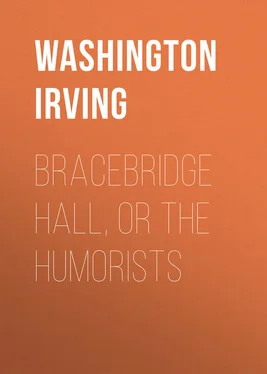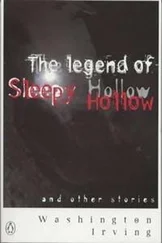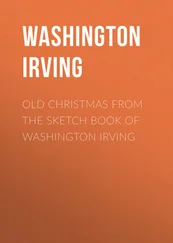Washington Irving - Bracebridge Hall, or The Humorists
Здесь есть возможность читать онлайн «Washington Irving - Bracebridge Hall, or The Humorists» — ознакомительный отрывок электронной книги совершенно бесплатно, а после прочтения отрывка купить полную версию. В некоторых случаях можно слушать аудио, скачать через торрент в формате fb2 и присутствует краткое содержание. Жанр: foreign_antique, foreign_prose, на английском языке. Описание произведения, (предисловие) а так же отзывы посетителей доступны на портале библиотеки ЛибКат.
- Название:Bracebridge Hall, or The Humorists
- Автор:
- Жанр:
- Год:неизвестен
- ISBN:нет данных
- Рейтинг книги:5 / 5. Голосов: 1
-
Избранное:Добавить в избранное
- Отзывы:
-
Ваша оценка:
- 100
- 1
- 2
- 3
- 4
- 5
Bracebridge Hall, or The Humorists: краткое содержание, описание и аннотация
Предлагаем к чтению аннотацию, описание, краткое содержание или предисловие (зависит от того, что написал сам автор книги «Bracebridge Hall, or The Humorists»). Если вы не нашли необходимую информацию о книге — напишите в комментариях, мы постараемся отыскать её.
Bracebridge Hall, or The Humorists — читать онлайн ознакомительный отрывок
Ниже представлен текст книги, разбитый по страницам. Система сохранения места последней прочитанной страницы, позволяет с удобством читать онлайн бесплатно книгу «Bracebridge Hall, or The Humorists», без необходимости каждый раз заново искать на чём Вы остановились. Поставьте закладку, и сможете в любой момент перейти на страницу, на которой закончили чтение.
Интервал:
Закладка:
The good parson had looked forward to this bibliographical expedition as of far greater importance than those to Africa or the North Pole. With what eagerness had he seized upon the history of the enterprise! with what interest had he followed the redoubtable bibliographer and his graphical squire in their adventurous roamings among Norman castles, and cathedrals, and French libraries, and German convents and universities; penetrating into the prison-houses of vellum manuscripts, and exquisitely illuminated missals, and revealing their beauties to the world!
When the parson had finished a rapturous eulogy on this most curious and entertaining work, he drew forth from a little drawer a manuscript, lately received from a correspondent, which had perplexed him sadly. It was written in Norman French, in very ancient characters, and so faded and mouldered away as to be almost illegible. It was apparently an old Norman drinking song, that might have been brought over by one of William the Conqueror's carousing followers. The writing was just legible enough to keep a keen antiquity-hunter on a doubtful chase; here and there he would be completely thrown out, and then there would be a few words so plainly written as to put him on the scent again. In this way he had been led on for a whole day, until he had found himself completely at fault.
The Squire endeavoured to assist him, but was equally baffled. The old general listened for some time to the discussion, and then asked the parson if he had read Captain Morris's, or George Stevens's, or Anacreon Moore's bacchanalian songs? On the other replying in the negative, "Oh, then," said the general, with a sagacious nod, "if you want a drinking song, I can furnish you with the latest collection – I did not know you had a turn for those kind of things; and I can lend you the Encyclopedia of Wit into the bargain. I never travel without them; they're excellent reading at an inn."
It would not be easy to describe the odd look of surprise and perplexity of the parson, at this proposal; or the difficulty the Squire had in making the general comprehend, that though a jovial song of the present day was but a foolish sound in the ears of wisdom, and beneath the notice of a learned man, yet a trowl, written by a tosspot several hundred years since, was a matter worthy of the gravest research, and enough to set whole colleges by the ears.
I have since pondered much on this matter, and have figured to myself what may be the fate of our current literature, when retrieved, piecemeal, by future antiquaries, from among the rubbish of ages. What a Magnus Apollo, for instance, will Moore become, among sober divines and dusty schoolmen! Even his festive and amatory songs, which are now the mere quickeners of our social moments, or the delights of our drawing-rooms, will then become matters of laborious research and painful collation. How many a grave professor will then waste his midnight oil, or worry his brain through a long morning, endeavouring to restore the pure text, or illustrate the biographical hints of "Come, tell me, says Rosa, as kissing and kissed;" and how many an arid old bookworm, like the worthy little parson, will give up in despair, after vainly striving to fill up some fatal hiatus in "Fanny of Timmol"!
Nor is it merely such exquisite authors as Moore that are doomed to consume the oil of future antiquaries. Many a poor scribbler, who is now, apparently, sent to oblivion by pastrycooks and cheese-mongers, will then rise again in fragments, and flourish in learned immortality.
After all, thought I, time is not such an invariable destroyer as he is represented. If he pulls down, he likewise builds up; if he impoverishes one, he enriches another; his very dilapidations furnish matter for new works of controversy, and his rust is more precious than the most costly gilding. Under his plastic hand, trifles rise into importance; the nonsense of one age becomes the wisdom of another; the levity of the wit gravitates into the learning of the pedant, and an ancient farthing moulders into infinitely more value than a modern guinea.
THE FARM-HOUSE
– "Love and hay
Are thick sown, but come up full of thistles."
– BEAUMONT AND FLETCHER.
I was so much pleased with the anecdotes which were told me of Ready-Money Jack Tibbets, that I got Master Simon, a day or two since, to take me to his house. It was an old-fashioned farm-house built with brick, with curiously twisted chimneys. It stood at a little distance from the road, with a southern exposure, looking upon a soft green slope of meadow. There was a small garden in front, with a row of bee-hives humming among beds of sweet herbs and flowers. Well-scoured milking tubs, with bright copper hoops, hung on the garden paling. Fruit trees were trained up against the cottage, and pots of flowers stood in the windows. A fat, superannuated mastiff lay in the sunshine at the door; with a sleek cat sleeping peacefully across him.
Mr. Tibbets was from home at the time of our calling, but we were received with hearty and homely welcome by his wife; a notable, motherly woman, and a complete pattern for wives; since, according to Master Simon's account, she never contradicts honest Jack, and yet manages to have her own way, and to control him in every thing.
She received us in the main room of the house, a kind of parlour and hall, with great brown beams of timber across it, which Mr. Tibbets is apt to point out with some exultation, observing, that they don't put such timber in houses now-a-days. The furniture was old-fashioned, strong, and highly polished; the walls were hung with coloured prints of the story of the Prodigal Son, who was represented in a red coat and leather breeches. Over the fire-place was a blunderbuss, and a hard-favoured likeness of Ready-Money Jack, taken when he was a young man, by the same artist that painted the tavern sign; his mother having taken a notion that the Tibbets had as much right to have a gallery of family portraits as the folks at the Hall.
The good dame pressed us very much to take some refreshment, and tempted us with a variety of household dainties, so that we were glad to compound by tasting some of her homemade wines. While we were there, the son and heir-apparent came home; a good-looking young fellow, and something of a rustic beau. He took us over the premises, and showed us the whole establishment. An air of homely but substantial plenty prevailed throughout; every thing was of the best materials, and in the best condition. Nothing was out of place, or ill made; and you saw every where the signs of a man that took care to have the worth of his money, and that paid as he went.
The farm-yard was well stocked; under a shed was a taxed cart, in trim order, in which Ready-Money Jack took his wife about the country. His well-fed horse neighed from the stable, and when led out into the yard, to use the words of young Jack, "he shone like a bottle;" for he said the old man made it a rule that every thing about him should fare as well as he did himself.
I was pleased to see the pride which the young fellow seemed to have of his father. He gave us several particulars concerning his habits, which were pretty much to the effect of those I have already mentioned. He had never suffered an account to stand in his life, always providing the money before he purchased any thing; and, if possible, paying in gold and silver. He had a great dislike to paper money, and seldom went without a considerable sum in gold about him. On my observing that it was a wonder he had never been waylaid and robbed, the young fellow smiled at the idea of any one venturing upon such an exploit, for I believe he thinks the old man would be a match for Robin Hood and all his gang.
I have noticed that Master Simon seldom goes into any house without having a world of private talk with some one or other of the family, being a kind of universal counsellor and confidant. We had not been long at the farm, before the old dame got him into a corner of her parlour, where they had a long, whispering conference together; in which I saw, by his shrugs, that there were some dubious matters discussed, and by his nods that he agreed with every thing she said.
Читать дальшеИнтервал:
Закладка:
Похожие книги на «Bracebridge Hall, or The Humorists»
Представляем Вашему вниманию похожие книги на «Bracebridge Hall, or The Humorists» списком для выбора. Мы отобрали схожую по названию и смыслу литературу в надежде предоставить читателям больше вариантов отыскать новые, интересные, ещё непрочитанные произведения.
Обсуждение, отзывы о книге «Bracebridge Hall, or The Humorists» и просто собственные мнения читателей. Оставьте ваши комментарии, напишите, что Вы думаете о произведении, его смысле или главных героях. Укажите что конкретно понравилось, а что нет, и почему Вы так считаете.












